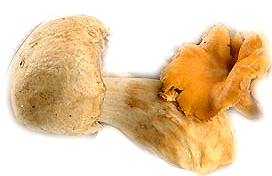|







|
|
 Porcini (Italian), Cèpe Boletus edulis, The
King, King Bolete. Penny Bun, , Borowik
(Polish), Stensopp (Danish and Swedish), Steinpilz (German),
Belya-grib (Russia) Porcini (Italian), Cèpe Boletus edulis, The
King, King Bolete. Penny Bun, , Borowik
(Polish), Stensopp (Danish and Swedish), Steinpilz (German),
Belya-grib (Russia)The
Porcini is found
in sparse deciduous and pine forests and in meadows. The brownish
black capped Porcini is found in southern climates in sparse oak and beech
forests. No other mushroom sells in the quantities on the European Market
as the Porcini (Cèpe) or "King" as it is sometimes called. The German
translation of the name means simply "the rock" coming from its
early appearance when it looks like a rock.
The mushroom is usually light to dark brown with a
bulbous, netted stalk that forms an apex above the ground. The mushroom
has no gills but has tubes under the cap that are white and turn to yellow
with age. The flesh is white to yellow with a red tinge just under the
surface of the cap, that can grow to a diameter of 10 inches. This
mushroom does not turn blue or discolor when cooked.
Storage Insect larvae tend to appear in
mushrooms that have been stored for a week or more under refrigeration.
Prime specimens with white pores will keep for 5 to 7 days under
refrigeration.
Preparation Canned, pickled, sautéed,
steamed, sauces
Said to be best when steamed with herbs and when served in a cream cause.
|
Season |
Jan |
Feb |
March |
April |
May |
June |
July |
Aug |
Sept |
Oct |
Nov |
Dec |
                                          
         |